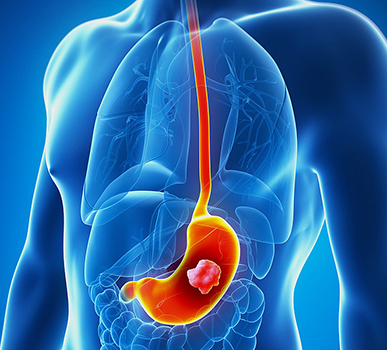
What is Gastric Cancer?
Gastric cancer, is a buildup and multiplication of abnormal cells that form a mass in part of the stomach. The accumulation of these extra cells forms a mass of tissue called tumor. It can develop in any part of the stomach. Most gastric cancers are adenocarcinomas, which develop in the cells of the stomach's inner lining.
What causes gastric cancer?
Gastric cancer occurs when normally healthy cells within the upper digestive system become cancerous and grow out of control, forming a tumor. This process happens slowly. Gastric cancer tends to develop over many years.
We at CAN-C, provide gastric cancer treatment in Bangalore.
Here, you will find information about signs and symptoms, causes and risk factors, types, diagnosis, staging and prevention about gastric cancer.
Some of the most common signs and symptoms of gastric cancer include:
Indigestion or heartburn
Vomiting (which may contain blood), Nausea, frequent burping
Pain or discomfort in the abdomen
Diarrhea or constipation
A sensation of being very full during meals
Bloating of the stomach after meals
Loss of appetite
Sensation of food getting stuck in the throat while eating
Unexplained tiredness or weakness, weight loss
Indigestion that does not resolve
Stomach pain, which may be worse after meals
Black-coloured faecess
Gastric cancer begins when healthy cells acquire a genetic change (mutation) that causes them to turn into abnormal cells. Some factors that can increase your risk of stomach cancer include:
Age: Stomach cancer occurs most common in people older than 55 years old
Tobacco: Using any form of tobacco: cigarettes, cigars, pipes, chewing tobacco increases the risk of gastric cancer
Alcohol Consumption: Heavy drinking over a long period of time increases the risk of developing gastric cancer
Obesity: Being severely overweight and having too much body fat can increase a person's risk
Diet: Eating a diet that contains a lot of salt-preserved foods has been linked to an increased risk of gastric cancer
Family history/genetics: Certain inherited genetic disorders may increase the risk of gastric cancer
Bacteria: Infection with the bacteria Helicobacter pylori causes stomach inflammation and ulcers
Most gastric cancers are a type called adenocarcinoma. This starts in the lining of your stomach, in cells that produce the stomach juices.
According to the type of tissue in which the cancer originates gastric cancers are classified as:
Adenocarcinoma: It is the most common type of gastric cancer which develops from the cells in the mucosa, the innermost lining of the stomach.
Lymphomas: These are the cancers which develop in the lymphatic tissue.
Sarcomas: These are cancers which start in the muscle or connective tissue of the stomach wall.
Carcinoid Cancers: These are cancers which start in neuroendocrine cells in the gastrointestinal tract.
We provide the best gastric cancer treatment in Bangalore.
The diagnosis of stomach cancer involves a number of different tests and examinations. Diagnosing gastric cancer includes:
Biopsy - To determine whether cancer cells are in the stomach.
Computed Tomography (CT) scans - To reveal detailed images of abdomen. These tests help determine where the cancer is in the stomach and whether it has spread to other abdominal organs.
Magnetic resonance imaging (MRI) - To help for staging gastric cancer.
Positron emission tomography (PET) scan - To help determine the stage of the disease and whether it has spread.
Ultrasound - Used if the fluid is found in your abdomen and to check for tumours that have spread to other organs.
Tumour, node and metastasis (TNM) staging is one of the systems used to stage gatsric cancer.
Tumor (T): How deeply has the primary tumor spread into the stomach wall?
Node (N): Has the tumor spread to the lymph nodes? If so, where and how many?
Metastasis (M): Has the cancer spread to other parts of the body?
Adopting a healthy lifestyle is one of the best ways to reduce your risk factors for gastric and other cancers:
Avoiding or quitting tobacco use
Cut down on alcohol
Avoid processed meat
Exercise regularly
Maintain a healthy weight
Eating a diet high in fresh vegetables and fruit and low in smoked, pickled and salted foods
"CAN-C: Well renowned centre for gastric cancer treatment in Bangalore"
Make An Appointment Today
How Gastric Cancer is treated?
Treatment of gastric cancer will be based on your health and specific information about the cancer (i.e. stage of the cancer, location of the tumour in the stomach and many others). If diagnosed early, surgery is the first-line treatment for stomach cancer, sometimes in combination with chemotherapy and/or radiation treatment.
Surgery is often used to treat gastric cancer. The type of surgery you have depends mainly on the size and location of the tumour. In many cases of planned surgery, chemotherapy is administered before and after surgery to improve cancer outcomes. Minimally invasive surgical techniques tend to be the preferred surgical method as they are considered to reduce complications, pain and recovery times and lower the possibility of the cancer returning compared to open surgeries.
Several surgical options are available.
Endoscopic mucosal resection: This involves removing tiny tumors from the mucosal layer. This type of treatment is recommended for early stage gastric cancer that has not yet spread to other tissues.
Subtotal gastrectomy: This involves removing part of the stomach.
Total gastrectomy: This involves removing the whole stomach.
Radiation therapy may be used to treat gastric cancer at any stage. The type of radiation therapy used most often is external beam radiation therapy. It may be used before surgery to shrink the size of the tumor, or after surgery to destroy any remaining cancer cells in the stomach. Radiation treatment is often combined with chemotherapy treatment. Radiotherapy (also known as radiation therapy) uses x-rays to damage or kill cancer cells so they cannot multiply. The radiation is targeted at the parts of the body with cancer.
We, provide the very best gastric cancer treatment in Bangalore.
Chemotherapy may be used to treat gastric cancer at any stage. Radiation therapy may be given at the same time as chemotherapy (chemoradiation). Chemotherapy uses drugs to kill or slow the growth of cancer cells. For gastric cancer, chemotherapy is commonly given before surgery to shrink large tumours and destroy any cancer cells that may have spread. It may also be used after surgery to reduce the chance of the disease coming back. Chemotherapy is also used on its own as a palliative treatment. Chemotherapy is usually given into a vein in your arm through a drip (intravenously). It may also be given through a tube called a port, catheter or vascular access device. Some chemotherapy drugs for gastric cancer are given as tablets.
Trastuzumab (Herceptin) and ramucirumab (Cyramza) are targeted therapy drugs used to treat advanced, metastatic or recurrent gastric cancer. Targeted therapies recognize and attack specific proteins that cancer cells produce. While chemotherapy targets rapidly dividing cells in general, targeted medications home in on cancer cells with other characteristics.
This is a treatment that uses medicines to encourage the body's immune cells to attack cancer cells. Immunotherapy treatment is for preventing, managing, or treating different cancers can also be used in combination with surgery, chemotherapy, radiation, or targeted therapies to improve their effectiveness.
Immunotherapy can:
1. Educate the immune system to recognize and attack specific cancer cells
2. Boost immune cells to help them eliminate cancer
3. Provide the body with additional components to enhance the immune response
Immunotherapy can be given in different ways, including: orally, as pills (tablets, capsules) or liquid, intravenously (injected into a vein), as a cream to rub onto skin, intravesically, administered directly into the bladder.
At CAN-C, get top-quality treatment for gastric cancer in Bangalore.
Palliative treatment aims to manage symptoms and improve people's quality of life without trying to cure the disease. It may be beneficial for people at any stage of advanced gastric cancer. Palliative treatment for gastric cancer may include surgery, stenting, radiation therapy, chemotherapy or other medicines. These treatments can help manage symptoms such as pain, bleeding, swallowing difficulty and nausea. They can also slow the spread of the cancer.
Our Doctors
Dr. Dinesh M G
Specialty: Surgical Oncologist & Laparoscopic Oncosurgeon
Dr. Dinesh M G, is an efficient surgeon specialized in oncology committed to the care and improvement of quality of life of cancer patients. His exceptional surgical skills, teamwork and knowledge are laudable. He is skilled in performing various minimal access oncologic surgeries and has mastered complex open surgeries in the field of oncology.
Completing MBBS from KIMS, Bangalore followed by MS - General Surgery from JJM Medical College, Davangere and M. Ch - Surgical Oncology from Kidwai Memorial Institute of Oncology, he has a Fellowship in Minimal Access Oncology from Basavatarakam Indo American Cancer Institute.

